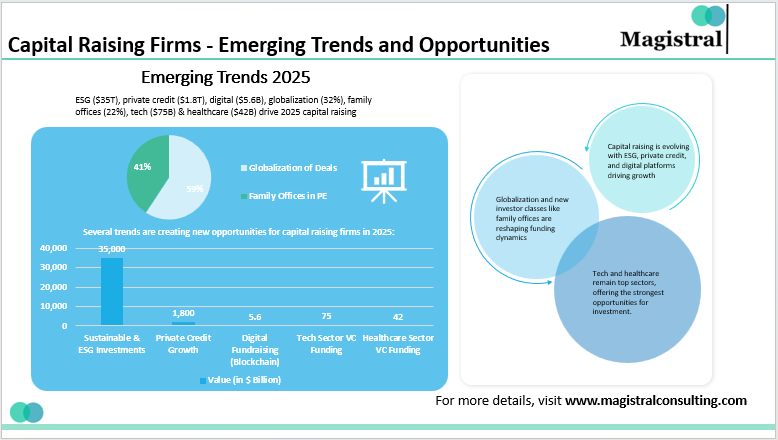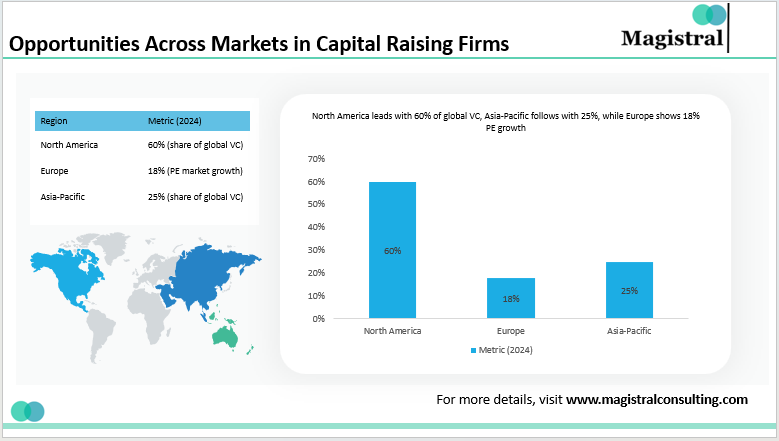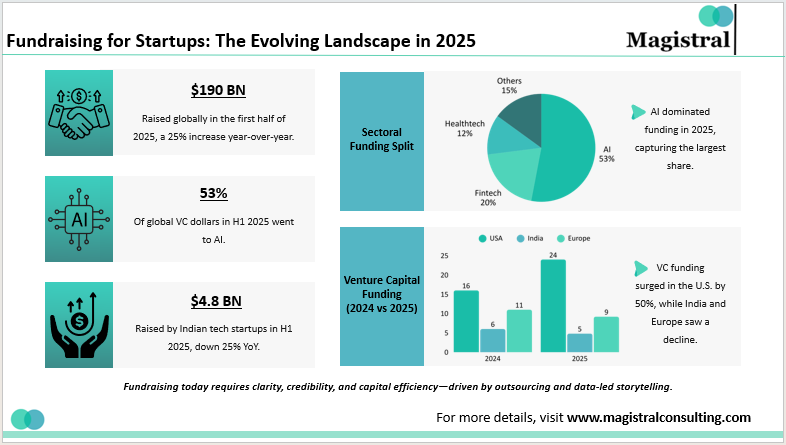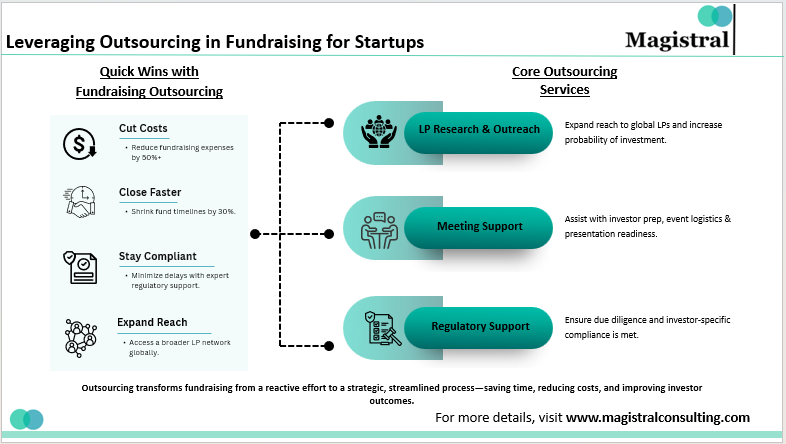With evolving market conditions, capital raising firms respond to trends such as digitization, sustainability, and private credit markets. We will explore the capital raising landscape with reference to market dynamics, key metrics, trends, and opportunities shaping the industry in 2025.
Market Overview: Capital Raising in 2025
As businesses continue to scale and seek external funding, the role of capital raising firms is ever more critical. According to the Report of 2025, 2024 has marked a 24% decline in fund-raising for global private equity, making it worth $1.1 trillion, a period that had both challenges and opportunities. The drawdown was due to macroeconomic factors like inflation, uptick in interest rates, and market volatility; however, the appetite for tech and sustainable sectors remain quite robust. Global VC dynamism waned in 2024 with the total amount invested down by 25 percent to an amount presently sitting at $184 billion. Comparatively speaking, it was $245 billion in 2023. However, trends are evident that funding is much more clearly geared toward later-stage companies than early-stage startups.
Types of Capital Raising Firms
Capital raising is organized in sectors. Each sector may in fact approach several capital raising strategies.
Investment Banks
Firms like Goldman Sachs, JP Morgan, and Morgan Stanley have historically dominated the equity capital markets and continue to lead in IPOs, secondary offerings, and M&A.
Private Equity (PE) Firms
PE firms provide “growth capital” and exercise nurturing control to scale businesses. Fundraising dropped to $529 billion in 2024, from $712 billion in 2023, according to a report. However, PE remains one of the most significant fundraising mechanisms, especially in healthcare, technology, and energy transition sectors.
Venture Capital Firms
Venture capital firms are geared toward companies with high-growth, early-stage companies, which further continue to nurture innovation. In 2024, the median size of a seed-stage round had increased by 20% over the prior year, showing investors’ high confidence in high-potential startups.
Boutique Advisory Firms
Smaller firms usually provide highly focused and specialized services for niche industries. It usually deals with complex transactions like debt restructuring and mergers. In 2024, these smaller firms saw together action in the tech and health sectors, with over a third of tech and health deals being advised by a boutique firm.
Capital Raising Process
The capital raising process is multi-faceted, with various stages all driven by specific data metrics:
Preparation and Assessment
Target Capital Amount
How much the company would really like to raise is usually tied to its growth projections.
Valuation
Startups with revenue multiples or market potential as a basis for valuation. Going by multiples of revenue or by total market potential for a valuation. In 2024, the average revenue multiple for early-stage SaaS companies was 10x.
Engagement and Deal Structuring
Investor Engagement
Capital raising firms draw on their investor networks to bring in HNWIs, family offices, and institutional investors.
Terms Negotiation
In 2024, during the capital raising process, venture capital firms would take an average 22% stake, as opposed to the of-the-year 19% stake in 2023.
Marketing and Investor Outreach
Investor Types
Institutional investors such as pension funds and sovereign wealth funds formed around 45% of capital in 2024; meanwhile, high net-worth individuals (HNWIs) and family offices constituted 30% of the total.
Platform Utilization
The capital markets are changing with technology powering the rise in digital platforms for capital raising. Seders, Crowd cube, and Republic passed the $2.8 billion mark in early-stage investments in 2024-a 30% increase relative to 2023-established-shift towards democratized capital raises.
Closing the Deal
Time to Close: On average, 15% increase in the time to close a round of fundraising in the past two years-from about 6.5 months in 2022 to 7.5 months in 2024. This delay can be vintage to increase due diligence and complicated deal structures.
Emerging Trends and Opportunities in Capital Raising
Several trends will spawn new opportunities for capital raising firms in 2025.

Opportunities Across Markets in Capital Raising Firms
Sustainable and ESG Investments
It is data that tells that sustainable investment reached a $35 trillion washing in 2024, up 10% from 2023. Increasingly, the capital raising companies structure their deals from an ESG perspective, with 41% of private-equity firms looking at the ESG impact before an actual investment decision is made.
Private Credit Growth
With banks having tightened their lending standards, private credit is riding the big high of growth. The global private credit market is expected to reach about $1.8 trillion by 2026.
Digital and Alternative Fundraising Platforms
The rise of digital capital-raising platforms is reshaping industry. An insane amount of activity has been observed in tokenized assets.
Globalization of Investment
Cross-border investment is becoming very common with globalization of capital markets. Venture capital deals involving foreign investors reached 32% in 2024 from 25% in 2023, showing a more interconnected financial system has evolved. This offers capital raising firms a chance to extend their services internationally and reach out to global investor networks.
Rise of Family Offices
With time family offices have increasingly taken the capital raising activity away from other players. When one set of data is considered, family offices were found to have participated in almost 22% of private equity deals in 2024. This change hints at growing interest in the custom and flexibility that family offices can allow an investment approach.
Focus on Tech and Healthcare Sectors
Investment in technology and healthcare has always been on the rise. Healthcare companies raised $42 billion, obviously showing much more interest once again from investors in these high-growth sectors. Firms that raise capital and have the expertise in these industries stand to benefit from the better position to grab these opportunities.
Regional Insights: Opportunities Across Markets
Whatever may be said about the global nature of capital raising, regional trends shape the opportunity for capital raising firms.

Opportunities Across Markets in Capital Raising Firms
North America
The U.S. remains the biggest market for the venture capital and private equity, covering over 60% of all global VC investment in 2024. Late-stage financing thus would continue to dominate in the San Francisco Bay Area and beyond, as mature startups strive to seek larger funding rounds. Likewise, sustainable investment and private credit also offer huge opportunities.
Europe
European private equity and venture capital are catching increasing interest from institutional investors. The European private equity market grew by 18% in 2024, with a strong presence in healthcare, technology, and energy transition.
Asia-Pacific
Private equity and venture capital investments flourish in the Asia-Pacific region, with China, India, and Southeast Asia being top three destinations. 2024 will see Asia getting 25% of the world’s VC funding, with fintech and clean energy at the zenith of priority targets.
Middle East and Africa
The Middle East, especially the Gulf Cooperation Council (GCC) area, experiences significant growth in private equity and venture capital investments. Sovereign wealth funds (SWFs) of the UAE and Saudi Arabia continue to be very active in financing large, infrastructure projects. Capital raising firms that can bring cross-border perspectives and mastery of regulatory processes will undoubtedly pursue excellent opportunities in this region.
Services offered by Magistral Consulting
Magistral Consulting offers a range of services that help capital-raising firms in flexibility and decision making:
Investor Identification & Profiling
We create detailed target investor lists and profiles, including the investment thesis and key decision-makers.
Investor Communication & Outreach
We design custom outreach campaigns across email, LinkedIn, and events, and prepare pitch decks and teasers.
Fundraising Collateral Preparation
Creates pitch decks, CIMs, teasers, and financial models to support negotiations and attract investors.
Investor Tracking & Reporting
We manage the overall process, help investor outreach and tracks engagement through CRM systems, providing progress reports.
Market Intelligence & Insights
Offers sector-specific reports and insights relevant to the investor’s priorities to ensure fundraising fits investor interests.
End-to-End Fundraising Support
Manages the complete fundraising process from investor identification to deal closure.
AI-Driven Investor Engagement
AI enables personalized outreach as it also analyzes investor sentiments for enhanced investor engagement.
About Magistral Consulting
Magistral Consulting has helped multiple funds and companies in outsourcing operations activities. It has service offerings for Private Equity, Venture Capital, Family Offices, Investment Banks, Asset Managers, Hedge Funds, Financial Consultants, Real Estate, REITs, RE funds, Corporates, and Portfolio companies. Its functional expertise is around Deal origination, Deal Execution, Due Diligence, Financial Modelling, Portfolio Management, and Equity Research
For setting up an appointment with a Magistral representative visit www.magistralconsulting.com/contact
About the Author

Akansha is a Stanford Seed alum with an MBA (Finance & Operations) and B.Com (Hons). She delivers business and financial research for PE/VC and investment banking clients. Experience spans fundraising, M&A support, deal sourcing, consolidation accounting, supply chain analysis, and CRM-led outreach. Known for meticulous detail and fast learning, she turns analysis into investor-ready decisions.
FAQs
What challenges do capital raising firms face in 2025?
How have family offices impacted capital raising?
What trends are shaping capital raising in 2025?
How are digital platforms changing capital raising?
What regional opportunities exist for capital raising firms?

